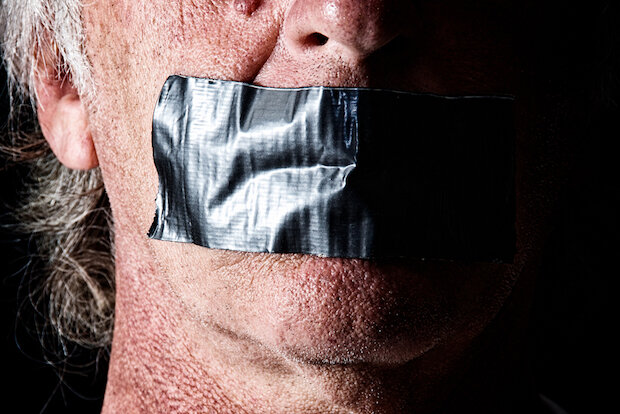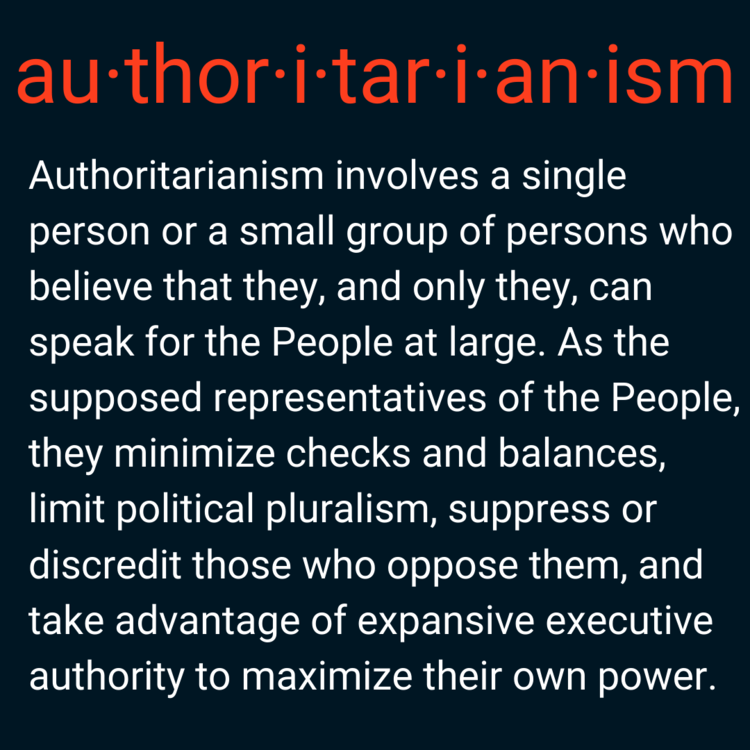Censored news. Secret police. An empty refrigerator. Little or no electricity. These are the grim images that come to mind at the mention of the words “authoritarian” or “tyrannical” to describe a society, a society where the human spirit is crushed. Certainly, there are states just like that (such as North Korea). But, for the most part, authoritarian governments are much more subtle than that stereotype in their practice, and much harder to recognize in their creation and formation—until it is almost too late to stop them.
In its most basic form, authoritarianism involves a single person or a small group of persons who believe that they, and only they, can speak for the People at large. As the supposed representatives of the People, they minimize checks and balances, limit political pluralism, suppress or discredit those who oppose them, and take advantage of expansive executive authority to maximize their own power. Sometimes, their control is maintained through the cold steel barrel of a gun. More often, their power is kept in ways that actually mimic a democracy. Elections are held, institutions exist, and the economy is productive. However, the effect of those democratic hallmarks is imaginary in an authoritarian state.
In a true democracy, elections have predictable rules but unpredictable results; in an authoritarian government, the reality is often the exact opposite with rules that frequently change but results that stay the same. Institutions such as the courts, the legislature, and the press are kept weak and unable to question the nation’s leadership. The economy is corrupted into personal patronage networks and is frequently limited in its commodities (see Russia or Venezuela), making it particularly vulnerable to global trends. Holding this repressive system together is the powerful tandem of authoritarian leaders and their lies.
Interestingly, these lies are meant to disguise a highly uncomfortable truth. The very fact that authoritarian governments go through the charade of pretending to have things like elections and institutions is because they are uncomfortable being perceived as authoritarian. To gain respect and legitimacy—inside and out—they create the window-dressings of democracy. Indeed, isn’t imitation the best form of flattery?
True democracy is partly premised on acknowledging a fundamental truth about human beings: we’re fallible. We make mistakes. That being the case, it is best to hear from a large body of people before making a decision and, every so often, we change our decision-makers to introduce fresh blood into our collective body-politic. That’s why real democracies place so much value on the right to vote. Authoritarian governments do the opposite. By vesting a huge amount of power in a single person—or a small group of persons— indefinitely, they presume that person or persons are infallible. Since nobody can actually be infallible, those in charge are forced to lie to maintain control. In the short term, they may get away with it. After all, there have been plenty of intelligent and capable authoritarians, skilled at both the affairs of state and at the art of deception. But lies are an unstable foundation for any government over the long-term, and eventually, the people wise up to them, frequently leading to protest and sometimes, to regime change.

At its best, the United States is a place that elevates the pursuit of truth, where the press is independent and offers clear facts and competing perspectives. And despite its many shortcomings, our democracy allows us to hear new voices, helping us to self-correct and better embody the principles upon which the United States was founded. That wouldn’t be possible in an authoritarian regime, where only the ruling party can be right.
The above might seem like a political cliché, but the ability to speak out, to be heard, and to effect real change has been an instrumental part of American history. Even during some of our darkest days, when the insidious lies of white supremacy and Jim Crow remained firmly entrenched in the hearts and minds of the public, as well as the institutions of power from the local police to Congress, citizens rose up to bring forth profound and lasting change. Ordinary people led and represented by Civil Rights heroes such as Martin Luther King Jr, John Lewis, and Rosa Parks marched, protested, and risked everything to spread the idea of equality and dignity for all.
The Civil Rights movement did not make progress by thinking up new values, but instead by invoking our founding principles and calling upon the country to live up to them. Indeed, on Independence Day, 1852, Frederick Douglass said, “Cling to this day — cling to it, and to its principles, with the grasp of a storm-tossed mariner to a spar at midnight.” We must remember his words now more than ever. Freedom is in the DNA of our constitutional democracy, and as long as we remain willing to speak and fight on its behalf, we can ensure its survival.




